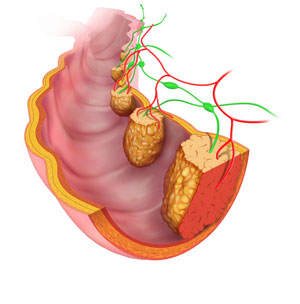Recurrent Colon Cancer

What is Recurrent Colon Cancer?
Recurrent colon cancer is when colon cancer returns after it has been fully treated. Generally, the patient must be free of colon cancer for at least a year before recurrent colon cancer may be diagnosed. If the cancer is found a few months after treatment, it is usually an advanced form of original cancer that was not fully eradicated by the treatment.
Types of Recurrent Colon Cancer
Colon cancer may be classified as:
- Local Recurrence: In this type, the cancer cells are found at the site of original cancer.
- Regional Recurrence: In this type, the cancer cells are found in the lymph nodes located near the site of original cancer.
- Metastatic Recurrence: In this type, the cancer cells are found in a different part of the body such as the liver or lungs.
Symptoms of Recurrent Colon Cancer
Symptoms of recurrent colon cancer depend on the site of recurrence and may include:
- Abdominal pain
- Constipation
- Diarrhoea
- Lack of appetite
- Blood in the stools
- Fatigue
- Pelvic pain
- Back pain
- Difficulty breathing
Diagnosis of Recurrent Colon Cancer
A diagnosis can be made during follow-up visits that are scheduled after treatment of the initial colon cancer. Based on your signs and symptoms, your doctor may order a colonoscopy to examine the entire length of the colon, blood tests to look for certain proteins that are indicative of colon cancer, and CT scans of the pelvis, stomach, and chest to look for spread of cancer.
Treatment of Recurrent Colon Cancer
Treatment of recurrent colon cancer will depend on the location of cancer, the amount of time elapsed since treatment of original cancer, and your overall health. The various treatment options include:
- Chemotherapy: You may be given different chemotherapy drugs to treat recurrent colon cancer as the cancer cells may have become resistant to the initial chemotherapy regimen.
- Surgery: In case of local recurrence or regional recurrence of colon cancer, surgical removal of the cancerous lesions may be done. If cancer has spread to other parts of the body such as the liver or lungs, surgery is still an option if there are only a few cancer lesions. Surgery is generally combined with other treatments such as chemotherapy.
- Radiation Therapy: This may be an option if you have not received radiation therapy when treating the first instance of colon cancer. The therapy involves the use of high-energy X-rays to destroy cancer cells. Radiation therapy is often given when surgery is not recommended due to the proximity of the cancerous lesions to vital anatomical structures or the presence of too many cancerous lesions.








